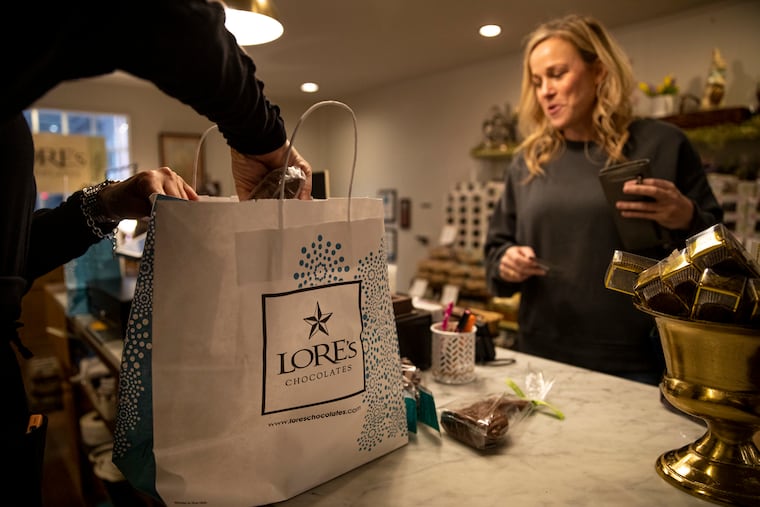Fines for violating Philly’s plastic bag ban start Friday. Here’s how businesses are complying.
The city’s plastic bag ban has been in place since July, but until now, it has been only enforced with warnings.

Many restaurants, takeout spots, and retailers are still struggling to recover from the pandemic. Now, as enforcement of the city’s plastic bag ban starts Friday, they are facing another hurdle — paying for non-plastic bags or requiring customers to bring their own.
Most businesses in West Philadelphia will be complying, said Jabari Jones, president of the West Philadelphia Corridor Collaborative, but it hasn’t been easy on their bottom lines or their customers.
“There has definitely been a financial effect,” Jones said, adding that some business owners switching to paper from plastic report their costs are double for less than half the number of bags. “Every single penny counts from a profit standpoint for them.”
The city’s plastic bag ban has been in place since July, but until now, it has been only enforced with warnings. With full enforcement, business owners now could face fines, which start at $150, if they don’t provide recyclable paper or other bags or require customers to bring their own bags.
Because the ban has been in place, most businesses aren’t rushing to make last-minute changes, and most customers are unlikely to notice any difference in their shopping experiences.
Some environmental experts and advocates say the move marks a meaningful step toward less plastic pollution, one they hope is compounded on in the future with amendments such as a mandatory bag fee.
Philadelphia businesses are not currently mandated to charge for paper or multi-use bags, but City Councilmember Mark Squilla, who sponsored the bag ban bill, said he and his colleagues are “working on” implementing that.
Such a fee “would certainly help with compliance,” said Faran Savitz, zero waste advocate for PennEnvironment, a nonprofit advocacy group, which this winter found many Philadelphia businesses weren’t complying with the ban. And “the fee gets people to use fewer bags in general.”
Advocates say bans, regardless of their form or whether they’re accompanied by fees, are resulting in less trash and a cleaner environment. In California, the first state to introduce such legislation, plastic bag litter along beaches and rivers dropped by 72% after the ban went into effect in 2016. After Washington, D.C., imposed a five-cent fee for all paper and plastic bags, it saw a significant reduction in the use of disposable bags. About 75% of residents reduced their bag usage and most businesses handed out fewer bags by at least half, according to the District.
In Philadelphia, the ban should have a similar result, resulting in less trash on the streets, fewer hours spent by city workers cleaning up that trash, and less plastic pollution, said Sherri Mason, director of sustainability at Penn State Behrend in Erie.
“No policy is perfect. There will always be people who find the loopholes, but [a measure like the plastic bag ban] pushes you in the direction you want to go,” Mason said. “When these changes start taking effect, you see it in your physical environment and people want more.”
In Center City, customers of Lore’s Chocolate have for months been toting their goodies in the shop’s new custom, imprinted paper bags. So when full enforcement of the plastic bag ban begins, the chocolatier will be ready.
While the change has cost money, “I think customers do appreciate it,” said owner Tony Walter, Jr. “It is a net positive.”
It’s a process stores in other cities and states have undergone in recent years. Along with California, Delaware, New York, Maine, Vermont, Connecticut, and Oregon have all banned single-use plastic bags, along with every jurisdiction in Hawaii. A ban will go into effect in New Jersey on May 4.
The plastics industry and some lawmakers nationwide have pushed back against the bans, in part citing the impact on small businesses, and studies have found that reusable bags must get prolonged use in order to have less of an environmental impact than single-use plastic bags. A 2017 Canadian study found that traditional plastic bags had less of an overall environmental impact than paper or thicker plastic bags — except when plastic bags are left on the street as litter.
Philadelphians use nearly a billion plastic bags every year, according to the city.
Since Philadelphia began giving out warnings for bag ban violations in October, 199 have been issued, said Karen Guss, spokesperson for the city Department of Licenses and Inspections.
Large retailers are complying with the ban in different ways:
Wawa encourages customers to forgo a bag when they can, but also sells reusable bags for 35 cents.
Acme stores are offering reusable bags for purchase.
Fine Wine & Good Spirits stores have reusable totes for purchase, as well as the empty boxes they’ve always provided for large orders.
Target stores offer either paper or “reusable plastic” bags at their stores.
CVS and Rite Aid provide paper bags free of charge.
Whole Foods offers paper bags, having phased out plastic bags at all its stores in 2008.
Some smaller businesses have had to make difficult decisions.
In West Philadelphia, for instance, Jones said most restaurants and takeout food spots can’t afford to offer tote bags. In order to afford paper bags, he said, they plan to increase food prices.
At Cousins Fresh Market, which has three locations in west and southwest Philadelphia, owner Sayed Ahmad said people now have to bring their own bags.
“It’s very difficult and uncomfortable for the customers,” Ahmad said from his store at 64th and Woodland Avenue, adding that he worries people will start going to nearby Darby or Upper Darby to shop instead.
Staff writers Catherine Dunn and Justine McDaniel contributed to this article.